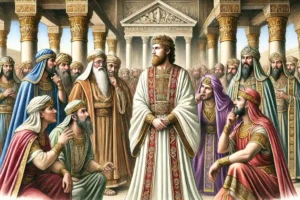
Judgment Against Edom
The judgment against Edom is a significant theme in the Old Testament, particularly in the prophetic books. Edom, a nation descended from Esau, the brother of Jacob, frequently found itself at odds with Israel. The Bible records numerous prophecies detailing Edom’s eventual downfall as a consequence of its actions against Israel and its persistent arrogance.
Quick Facts:
- Edom’s Origin: Edom was founded by Esau, the elder brother of Jacob, who sold his birthright for a meal (Genesis 25:29-34).
- Geographical Location: Edom was located southeast of Israel, primarily in the region now known as Jordan.
- Prophetic Books: Prophecies against Edom are found in books such as Obadiah, Isaiah, Jeremiah, and Ezekiel.
- Obadiah’s Prophecy: The entire book of Obadiah focuses on Edom’s judgment, emphasizing their pride and violence against Israel (Obadiah 1:10-14).
- Isaiah’s Oracle: Isaiah 34 and 63:1-6 describe Edom’s destruction as a symbol of God’s judgment against all nations opposing His people.
- Historical Conflict: Edom frequently warred with Israel and Judah, often allying with their enemies (Psalm 137:7).
- Divine Retribution: The prophecies highlight that Edom’s downfall is due to their arrogance, violence, and betrayal (Jeremiah 49:7-22).
Edom, a nation descended from Esau, the elder twin brother of Jacob (Israel), holds a significant place in biblical history and prophecy. Despite their shared lineage, Edom and Israel were frequently at odds, a tension that began with the brothers themselves. This animosity persisted through their descendants, often manifesting in conflict and hostility.
Historical Context: Edom occupied a strategic location southeast of the Dead Sea, in what is now southern Jordan. The Edomites controlled trade routes, which brought them wealth and power. Their capital, Sela (Petra), was renowned for its rock-cut architecture and defensible position. Edom’s relationship with Israel was marked by strife, often siding with Israel’s enemies during times of conflict (e.g., Psalm 137:7; 1 Kings 11:14-22).
Prophetic Judgment: The judgment against Edom is pronounced in several prophetic books, each highlighting different aspects of their transgressions and the divine retribution they would face.
- Obadiah:
- The book of Obadiah, the shortest in the Old Testament, is entirely dedicated to Edom’s judgment. It begins with a vision received by Obadiah, detailing Edom’s downfall due to their pride and violence against their “brother” Israel. Obadiah 1:3-4 states, “The pride of your heart has deceived you… Though you soar like the eagle and make your nest among the stars, from there I will bring you down,” declares the Lord.
- Obadiah condemns Edom for standing aloof when Jerusalem was invaded, rejoicing over Judah’s downfall, and looting the city (Obadiah 1:10-14). The prophet declares that Edom’s betrayal and arrogance will lead to their total destruction.
- Isaiah:
- In Isaiah 34, the prophet speaks of a broader judgment against all nations, with Edom serving as a primary example. This passage describes a scene of utter devastation and desolation, portraying Edom’s land as a burning wasteland inhabited by wild animals (Isaiah 34:9-15).
- Isaiah 63:1-6 presents a vivid image of the Lord coming from Edom, His garments stained with blood, symbolizing divine vengeance and the execution of justice.
- Jeremiah:
- Jeremiah 49:7-22 also addresses Edom’s impending doom. The prophet highlights their wisdom and military might but declares that these will not save them. The destruction will be so complete that Edom will become a desolation, with no one living in its cities (Jeremiah 49:17-18).
- Ezekiel:
Theological Insights: The judgment against Edom serves as a powerful reminder of the consequences of pride, betrayal, and hostility towards God’s people. Edom’s actions against Israel, particularly during their times of distress, exemplify the principle that those who oppose God’s purposes and oppress His people will face divine retribution.
Conclusion: The prophetic declarations against Edom illustrate a broader theological theme of justice and retribution. Despite their initial strength and strategic advantages, Edom’s persistent arrogance and antagonism towards Israel ensured their downfall. The biblical narrative uses Edom’s fate as a cautionary tale, emphasizing the importance of humility, righteousness, and alignment with God’s will. Edom’s ultimate destruction, foretold by the prophets, underscores the certainty of divine justice against those who defy God’s covenant and oppress His chosen people.



